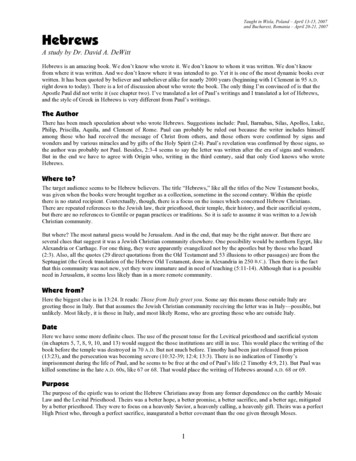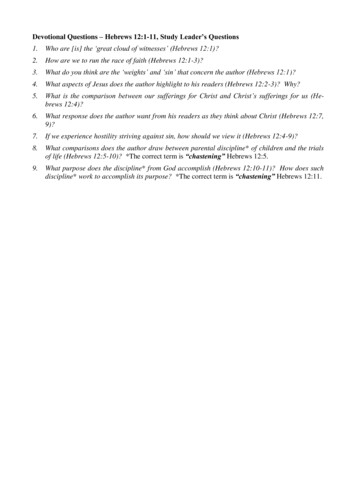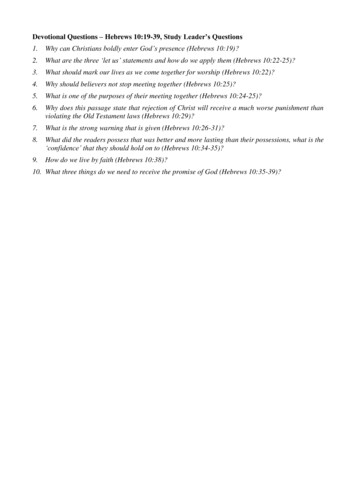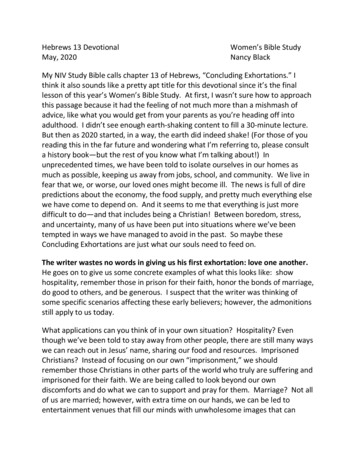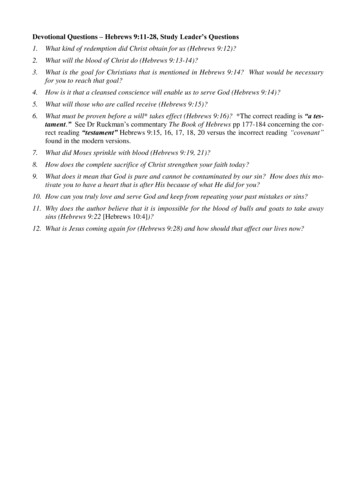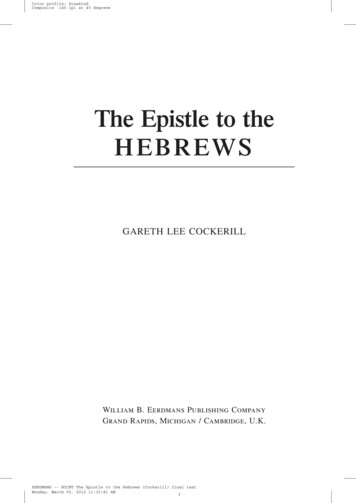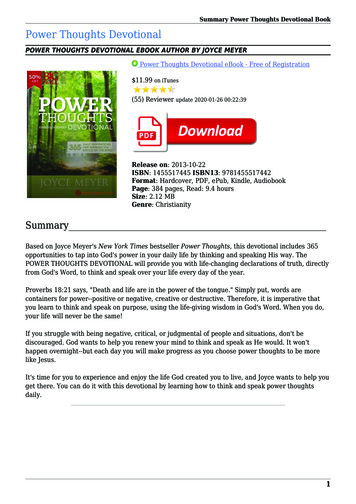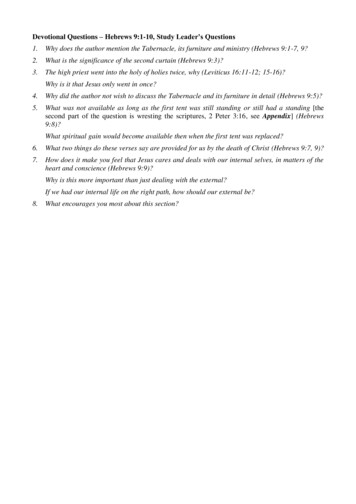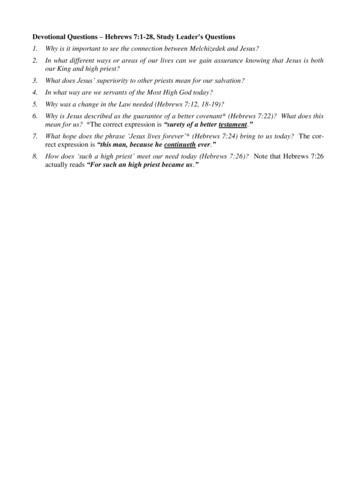
Transcription
Devotional Questions – Hebrews 13:1-9, Study Leader’s Questions1.What practical things should Christians be doing to demonstrate their love for Christ?Hebrews 13:1Hebrews 13:2Hebrews 13:3Hebrews 13:4Hebrews 13:5-62.How does getting our picture right about Jesus affect the way we engage the practical lessons ofHebrews 13:1-6?3.In the context of Hebrews 13 why are we told that Jesus does not change?4.How does Hebrews 13:8 fit into the message of Hebrews 13:4-7? How does Hebrews 13:8speak to you in the circumstances of your life?5.Why is it important for believers to have good doctrine (Hebrews 13:9)?6.Hebrews 13:9 speaks of our heart being strengthened by grace – what does this mean? Notethat the correct expression is “established with grace.” The NIVs are wrong, as usual.
2Devotional Questions – Hebrews 13:1-9, Answers to QuestionsSee Dr Ruckman’s commentary The Book of Hebrews pp 334-354 and the Ruckman Reference Biblepp 1615-1616 for detailed comments.1.What practical things should Christians be doing to demonstrate their love for Christ?The Lord Himself set out the first of these practical steps with respect to obedience to what theLord Jesus Christ has said.“He that hath my commandments, and keepeth them, he it is that loveth me: and he thatloveth me shall be loved of my Father, and I will love him, and will manifest myself to him”John 14:21.“Jesus answered and said unto him, If a man love me, he will keep my words: and my Fatherwill love him, and we will come unto him, and make our abode with him” John 14:23.Note that modern versions alter John 14:23 to take away the emphasis on individual words,NKJV, or to remove the emphasis on “The words of the LORD” Psalm 12:6 altogether, 1984NIV, 2011 NIV. They should be aware of John’s warning.“And if any man shall take away from the words of the book of this prophecy, God shall takeaway his part out of the book of life, and out of the holy city, and from the things which arewritten in this book” Revelation 22:19.Revelation 22:19 does not apply only to the Book of Revelation. The Book of Revelation is“the words of this prophecy” Revelation 1:3. “The words of the book of this prophecy” are“all scripture” that “is given by inspiration of God” 2 Timothy 3:16 i.e. “the book.”Returning to Hebrews 13:Hebrews 13:1“Let brotherly love continue.” Note that “brotherly love” is exclusively a Pauline expression,occurring only three times in scriptures, the other two times in the Pauline Epistles. See below.This is another pointer to Paul as the writer of Hebrews 13 and Hebrews 1-12. See Appendix The Most Likely Author, Paul “the forerunner” Hebrews 6:20.“Be kindly affectioned one to another with brotherly love; in honour preferring one another”Romans 12:10.“But as touching brotherly love ye need not that I write unto you: for ye yourselves are taughtof God to love one another” 1 Thessalonians 4:9.By letting brotherly love continue, the Christian shows his love for the Lord Jesus Christ byobedience to Him, see John 14:21, 23, that in turn yields a good testimony to “all men.”“A new commandment I give unto you, That ye love one another; as I have loved you, that yealso love one another. By this shall all men know that ye are my disciples, if ye have love oneto another” John 13:34-35.By being “kindly affectioned one to another with brotherly love” Romans 12:10 the Christianshows his love for the Lord Jesus Christ by following the Lord’s example which is “in honourpreferring one another” Romans 12:10 and “by love serve one another” Galatians 5:13.“For whether is greater, he that sitteth at meat, or he that serveth? is not he that sitteth atmeat? but I am among you as he that serveth” Luke 22:27.By loving one another, the Christian shows his love for the Lord Jesus Christ by a willingness tobe “taught of God” 1 Thessalonians 4:9 and thereby be the Lord’s faithful disciple.“It is written in the prophets, And they shall be all taught of God. Every man therefore thathath heard, and hath learned of the Father, cometh unto me” John 6:45.
3Note that Paul also says of “brotherly love” Hebrews 13:1 “And the Lord make you to increaseand abound in love one toward another, and toward all men, even as we do toward you” 1Thessalonians 3:12 i.e. that love amongst the brethren should grow. However, the emphasis ofHebrews 13:1 appears to be on continuance as a mark of true discipleship, as the Lord Himselfindicated and as Paul himself exhorted the Hebrews with respect to their very salvation.“Ye are they which have continued with me in my temptations” Luke 22:28.“For we are made partakers of Christ, if we hold the beginning of our confidence stedfastunto the end” Hebrews 3:14.Hebrews 13:2“Be not forgetful to entertain strangers.”By remembering to entertain strangers, the Christian shows his love for Christ directly insofaras, practically speaking, the Lord Himself could be among the strangers i.e. “angels unaware.”“For I was an hungred, and ye gave me meat: I was thirsty, and ye gave me drink: I was astranger, and ye took me in:.Verily I say unto you, Inasmuch as ye have done it unto one ofthe least of these my brethren, ye have done it unto me” Matthew 25:35, 40.Note again that this is a practical, not doctrinal, application. See the Ruckman Reference Biblepp 1285-1288.Hebrews 13:3“Remember them that are in bonds, as bound with them; and them which suffer adversity, asbeing yourselves also in the body.”By remembering “them that are in bonds” and “them which suffer adversity” the Christianshows his love for Christ because he is ministering to “the body of Christ, and members in particular” 1 Corinthians 12:27 as Paul explains.“That there should be no schism in the body; but that the members should have the same careone for another. And whether one member suffer, all the members suffer with it; or onemember be honoured, all the members rejoice with it” 1 Corinthians 12:25-26.That is in part why this writer keeps up a regular correspondence, 80 letters so far, with Bro.’sEdwards and Riolo in Attica State Prison, New York State. See Appendix - Prison Epistle.Hebrews 13:4“Marriage is honourable in all, and the bed undefiled: but whoremongers and adulterers Godwill judge.”By honouring marriage the Christian shows his love for Christ in that he honours what the Lordhonours and approves “thy righteous judgments” Psalm 119:7, 62, 106, 160, 164, all five occurrences of the expression “thy righteous judgments” in scripture.“And I say unto you, Whosoever shall put away his wife, except it be for fornication, and shallmarry another, committeth adultery: and whoso marrieth her which is put away doth commitadultery” Matthew 19:9.No-fault divorce en.wikipedia.org/wiki/No-fault divorce is not an option according to “thyrighteous judgments.”“And the third day there was a marriage in Cana of Galilee; and the mother of Jesus wasthere: And both Jesus was called, and his disciples, to the marriage” John 2:1-2.The Lord honours marriage because He Himself is to be married. “Let us be glad and rejoice,and give honour to him: for the marriage of the Lamb is come, and his wife hath made herselfready” Revelation 19:7.
4Hebrews 13:5-6“Let your conversation be without covetousness; and be content with such things as ye have:for he hath said, I will never leave thee, nor forsake thee” Hebrews 13:5.By eschewing covetousness and exercising contentment, the Christian shows his love for theLord Jesus Christ by maintaining faith in Him to provide all that is needful.“But my God shall supply all your need according to his riches in glory by Christ Jesus” Philippians 4:19.2.How does getting our picture right about Jesus affect the way we engage the practical lessons ofHebrews 13:1-6?Paul explains how “the new man.after the image of him that created him,” who is “inChrist.a new creature” 2 Corinthians 5:17 is enabled to fulfil the practicalities of Hebrews13:1-6. The following passage has been highlighted as well as underlined because it is key.“.seeing that ye have put off the old man with his deeds; And have put on the new man,which is renewed in knowledge after the image of him that created him:.Put on therefore, asthe elect of God, holy and beloved, bowels of mercies, kindness, humbleness of mind, meekness, longsuffering; Forbearing one another, and forgiving one another, if any man have aquarrel against any: even as Christ forgave you, so also do ye. And above all these things puton charity, which is the bond of perfectness” Colossians 3:9-10, 12-14.The Lord Jesus Christ is the personification of all the attributes listed above. To “put on thenew man” is to ask God to manifest “Christ in you, the hope of Glory” Colossians 1:27 consistently.3.In the context of Hebrews 13 why are we told that Jesus does not change?These are the Lord’s unchanging attributes in the context of Hebrews 13. His Faithfulness. The Lord will stick with you. “for he hath said, I will never leave thee,nor forsake thee” Hebrews 13:5. Note also this Old Testament promise that also applies fora New Testament believer.“It is of the LORD’S mercies that we are not consumed, because his compassions fail not.They are new every morning: great is thy faithfulness” Lamentations 3:22-23. His Guardianship. The Lord will look after you. “So that we may boldly say, The Lord ismy helper, and I will not fear what man shall do unto me” Hebrews 13:6. Note also thisOld Testament promise that also applies for a New Testament believer.“The angel of the LORD encampeth round about them that fear him, and delivereth them”Psalm 34:7. Note the common expression “round about.”See html. The list is not exhaustive. His Vindication. The Lord will reward you. “Remember them which have the rule overyou, who have spoken unto you the word of God: whose faith follow, considering the endof their conversation” Hebrews 13:7, “conversation” being both “seeing and hearing” 2Peter 2:7-8 i.e. “manner of life” Acts 26:4, 2 Timothy 3:10. Paul has already referred to theLord’s reward for faithful ministry.“For God is not unrighteous to forget your work and labour of love, which ye have shewedtoward his name, in that ye have ministered to the saints, and do minister” Hebrews 6:10.Note that “the end of their conversation” is “Jesus Christ the same yesterday, and to day,and for ever” Hebrews 13:8, as Paul explains:
5“Yea doubtless, and I count all things but loss for the excellency of the knowledge of ChristJesus my Lord: for whom I have suffered the loss of all things, and do count them butdung, that I may win Christ” Philippians 3:8. His Truth and Grace. The Lord can and will bestow them upon you because “grace andtruth came by Jesus Christ” John 1:17. “Be not carried about with divers and strange doctrines. For it is a good thing that the heart be established with grace; not with meats,which have not profited them that have been occupied therein” Hebrews 13:9. John praysfor believers that they will have grace and truth from the Lord Jesus Christ.“Grace be with you, mercy, and peace, from God the Father, and from the Lord JesusChrist, the Son of the Father, in truth and love” 2 John 3.By way of example, though martyred, William Tyndalenevertheless “was my faithful martyr, who was slainamong you, where Satan dwelleth” Revelation 2:13 andclearly the recipient of all the Lord’s attributes listedabove, as even Wikipedia effectively acknowledges.In 1535, Tyndale was arrested and jailed in the castle ofVilvoorde (Filford) outside Brussels for over a year. In1536 he was convicted of heresy and executed by strangulation, after which his body was burnt at the stake. His dying request that the King of England’s eyes would beopened seemed to find its fulfilment just two years laterwith Henry’s authorization of The Great Bible for theChurch of England — which was largely Tyndale’s ownwork. Hence, the Tyndale Bible, as it was known, continued to play a key role in spreading Reformation ideasacross the English-speaking world and eventually, onWilliam Tyndale 1494-1536the global British Empire. His version also worked en.wikipedia.org/wiki/William Tyndaleprominently into the Geneva Bible which was taken to“I defy the Pope, and all his laws; andthe New World to Jamestown in 1607, and on the MayifGod spares my life, ere many years, Iflower in 1620. Notably, in 1611, the 54 independentwill cause the boy that driveth the plowscholars who created the King James Version, drewto know more of the Scriptures thansignificantly from Tyndale, as well as translations thatthoudost!” – Tyndale to a rabid papistdescended from his. One estimate suggests the NewTestament in the King James Version is 83% Tyndale’s,and the Old Testament 76%.Because of “Jesus Christ the same yesterday, and to day, and for ever” Hebrews 13:8, WilliamTyndale was “valiant for the truth upon the earth” Jeremiah 9:3 and he did “win Christ” Philippians 3:8, praying for his killers as the Lord did, Luke 23:34. Given that Paul exhorts “Be yefollowers of me, even as I also am of Christ” 1 Corinthians 11:1, today’s believer should obeythe Lord’s exhortation and “Go, and do thou likewise” Luke 10:37 and seek to “win Christ.”4.How does Hebrews 13:8 fit into the message of Hebrews 13:4-7? How does Hebrews 13:8speak to you in the circumstances of your life?See Question 1 on John 14:23, Hebrews 13:4 and Question 3. Today’s believer should aim to“win Christ” Philippians 3:8 as Paul testified and as Tyndale did. As indicated above, to “winChrist” is that the Christian keeps the Lord’s words, plural, and the Christian shows his love forChrist in that he honours what the Lord honours and approves “thy righteous judgments”Psalm 119:7, 62, 106, 160, 164.Paul explains as follows, with respect to intercessory and personal prayer, which also has application to Question 1 and “brotherly love” Hebrews 13:1:
6“And this I pray, that your love may abound yet more and more in knowledge and in alljudgment; That ye may approve things that are excellent; that ye may be sincere and withoutoffence till the day of Christ” Philippians 1:9-10.To “win Christ” therefore, today’s believer should be willing to rebuke or at least resist pompous religious charlatans as Tyndale did, see above, and as the Lord did “Woe unto you, scribesand Pharisees, hypocrites!” Matthew 23:13, 14, 15, 23, 25, 27, 29, seven references in all, indicating God’s perfect rebuke – see Bible Numerics pp 23-27 by Dr Peter S. Ruckman.He should also be willing as the Lord said to “Render therefore unto Caesar the things whichare Caesar’s; and unto God the things that are God’s” Matthew 22:21, which includes making“first of all, supplications, prayers, intercessions, and giving of thanks.for all men; Forkings, and for all that are in authority; that we may lead a quiet and peaceable life in all godliness and honesty” 1 Timothy 2:1-2, which Tyndale did by his prayer at his execution i.e. statesponsored murder. Tyndale’s prayer, it should be noted, was answered. See above.That is to “win Christ” as Paul exhorted in 1 Thessalonians 5:9-10, a 24/7 relationship, not justthe occasional visit e.g. at a church meeting.“For God hath not appointed us to wrath, but to obtain salvation by our Lord Jesus Christ,Who died for us, that, whether we wake or sleep, we should live together with him.”5.Why is it important for believers to have good doctrine (Hebrews 13:9)?The reasons for the importance of believers having “good doctrine” include: The importance of keeping God’s laws. “For I give you good doctrine, forsake ye not mylaw” Proverbs 4:2. See remarks above in Question 4 with respect to Mathew 22:21 and notePaul’s and Peter’s exhortation to today’s believers on keeping God’s laws.“Let every soul be subject unto the higher powers. For there is no power but of God: thepowers that be are ordained of God” Romans 13:1.“Submit yourselves to every ordinance of man for the Lord’s sake: whether it be to theking, as supreme; Or unto governors, as unto them that are sent by him for the punishmentof evildoers, and for the praise of them that do well. For so is the will of God, that withwell doing ye may put to silence the ignorance of foolish men:.Honour all men. Love thebrotherhood. Fear God. Honour the king” 1 Peter 2:13-15, 17. Note that “Love the brotherhood” matches “Let brotherly love continue” Hebrews 13:1. The importance of being “sound in the faith” Titus 1:13 both for oneself and to be “a goodminister of Jesus Christ.” “If thou put the brethren in remembrance of these things, thoushalt be a good minister of Jesus Christ, nourished up in the words of faith and of gooddoctrine, whereunto thou hast attained” 1 Timothy 4:6 i.e. Timothy had mastered “gooddoctrine” such that he was fit to be put “into the ministry” 1 Timothy 1:12. Proverbs 4:2and 1 Timothy 4:6 are the only occurrences of the expression “good doctrine” in scripture. The importance of avoiding and/or refuting “divers and strange doctrines” Hebrews 13:9 sothat others can be “sound in the faith” Titus 1:13. This is why the Lord promised to “giveyou pastors according to mine heart, which shall feed you with knowledge and understanding” Jeremiah 3:15, as Paul further explains.“And he gave some, apostles; and some, prophets; and some, evangelists; and some, pastors and teachers; For the perfecting of the saints, for the work of the ministry, for the edifying of the body of Christ:.That we henceforth be no more children, tossed to and fro,and carried about with every wind of doctrine, by the sleight of men, and cunning craftiness, whereby they lie in wait to deceive; But speaking the truth in love, may grow up intohim in all things, which is the head, even Christ” Ephesians 4:11-12, 14-15. This passageshould also be highlighted.
7“Holding fast the faithful word as he hath been taught, that he may be able by sound doctrine both to exhort and to convince the gainsayers” Titus 1:9. This passage should also behighlighted. Note that the expression “sound doctrine” occurs only four times in scripture,all occurrences in the Pauline Epistles; 1 Timothy 1:10, 2 Timothy 4:3, Titus 1:9, 2:1.6.Hebrews 13:9 speaks of our heart being strengthened by grace – what does this mean? Notethat the correct expression is “established with grace.” The NIVs are wrong, as usual.Paul explains first with respect to drawing a distinction between the spiritual and the physical*.*Halal slaughter exemplifies “meats, which have not profited them that have been occupiedtherein” Hebrews 13:9. See roductionbrutal-or-humane.html.“For the kingdom of God is not meat and drink; but righteousness, and peace, and joy in theHoly Ghost” Romans 14:17.The heart is “established with grace” by means of “Christ in you, the hope of Glory” Colossians 1:27, because “grace and truth came by Jesus Christ” John 1:17, Questions 2, 3. It maythen show forth “righteousness, and peace, and joy in the Holy Ghost” i.e. “giving glory toGod” Romans 4:20 “in infirmities, in reproaches, in necessities, in persecutions, in distressesfor Christ’s sake” 2 Corinthians 12:10. As David says, with respect to a spiritual, not a physical establishment of the heart “He shall not be afraid of evil tidings: his heart is fixed, trustingin the LORD. His heart is established, he shall not be afraid, until he see his desire upon hisenemies” Psalm 112:7-8.In sum, the heart “established with grace” is fixed firm on and by “Christ in you, the hope ofGlory” Colossians 1:27, Question 2 and not swayed by bad news Psalm 112:7, infirmities, opposition, deprivations, 2 Corinthians 12:10, afflictions 1 Thessalonians
Devotional Questions - Hebrews 13:1-9, Answers to Questions See Dr Ruckman's commentary The Book of Hebrews pp 334-354 and the Ruckman Reference Bible . 16 i.e. "the book." Returning to Hebrews 13: Hebrews 13:1 "Let brotherly love continue." Note that "brotherly love" is exclusively a Pauline expression,
